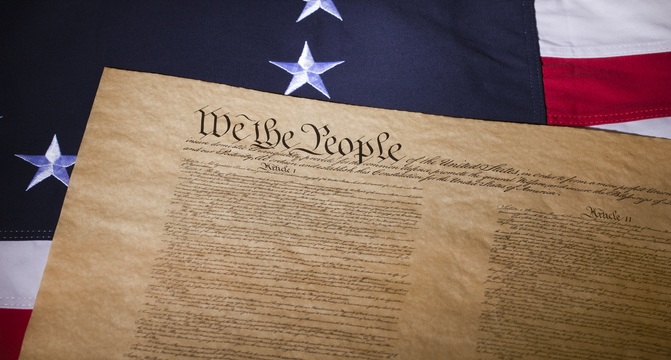One of the abortion movement’s (many) dirty little secrets is that, once you get a few levels above the foot soldiers who counter-protest sidewalk counselors and run angry Tumblr pages, nobody really takes Roe v. Wade seriously.
Many of their most respected legal scholars admit that it “borders on the indefensible,” is “not constitutional law and gives almost no sense of an obligation to try to be,” lacks “clear governing constitutional principles,” is “barely coherent” “constitutional origami,” and “the substantive judgment on which it rests is nowhere to be found.” No wonder—Roe misrepresents everything from medical knowledge to legal precedent to the history of abortion law.
But among Roe’s most grievous fallacies is the notion that the right to kill someone else is contained in the right to privacy. And now at least one pro-abort thinks it’s time to do something about this glaring weakness. In the Huffington Post, Columbia Law School’s Suzanne Goldberg calls on her side to replace the “popular, but inaccurate narrative” that “abortion rests solely on a tenuous right to privacy” with the “strong constitutional case for abortion.” I hate to break it to you, Professor, but you need to keep looking:
The right to abortion is grounded in the Fourteenth Amendment, which protects all of us from undue government interference with our liberty interests. More than 20 years ago, the Supreme Court made this clear when it reaffirmed the constitutional right to abortion in Planned Parenthood v. Casey. There, the Court explained that this right was rooted in a woman’s Fourteenth Amendment liberty right, which covers decisions about marriage, procreation, contraception, family relationships, child rearing and education.
In the words of the linchpin justices, Souter, O’Connor and Kennedy:
These matters, involving the most intimate and personal choices a person may make in a lifetime, choices central to personal dignity and autonomy, are central to the liberty protected by the Fourteenth Amendment.
At the heart of liberty is the right to define one’s own concept of existence, of meaning, of the universe and of the mystery of human life. Beliefs about these matters could not define the attributes of personhood were they formed under compulsion of the State.
Interesting, but dead wrong.
First, the Fourteenth Amendment applies to the aborted just as much as the aborting. Primary drafter John Bingham confirmed as much when he said it would apply to “any human being,” and the Roe court agreed—“If this suggestion of personhood is established, the appellant’s case, of course, collapses, for the fetus’ right to life would then be guaranteed specifically by the [Fourteenth] Amendment.” Modern embryology has established precisely that, so you do the math.
Second, the purpose of the Fourteenth Amendment was to extend full legal protection to former slaves, making it just a tad implausible that the statesmen who wrote it and voted on it or the citizens who ratified it thought they were liberalizing abortion laws in the process. Which raises the question: what did they think of the right to choose? I’ll see Professor Goldberg’s flowery quotes from Casey and raise her one historical analysis from Chief Justice William Rehnquist’s dissent:
Nor do the historical traditions of the American people support the view that the right to terminate one’s pregnancy is “fundamental.” The common law which we inherited from England made abortion after “quickening” an offense. At the time of the adoption of the Fourteenth Amendment, statutory prohibitions or restrictions on abortion were commonplace; in 1868, at least 28 of the then 37 States and 8 Territories had statutes banning or limiting abortion. J. Mohr, Abortion in America 200 (1978). By the turn of the century virtually every State had a law prohibiting or restricting abortion on its books. By the middle of the present century, a liberalization trend had set in. But 21 of the restrictive abortion laws in effect in1868 were still in effect in 1973 when Roe was decided,and an overwhelming majority of the States prohibited abortion unless necessary to preserve the life or healthof the mother. Roe v. Wade, 410 U. S., at 139-140; id.,at 176-177, n. 2 (Rehnquist, J., dissenting). On this record, it can scarcely be said that any deeply rooted tradition of relatively unrestricted abortion in our history supported the classification of the right to abortion as “fundamental” under the Due Process Clause of the Fourteenth Amendment.
Indeed, the legal lights the Founding Fathers counted as among the most authoritative, James Wilson and William Blackstone, were clear that the right to life began well before birth; the only reasons its protection wasn’t more absolute than what Rehnquist describes between the Founding and the Fourteenth Amendment were the technological constraints that severely limited (a) a full understanding of when exactly that life begins, and (b) the ability to prove that an early abortion took place. (Even so, those interested should read what the American Medical Association had to say on the subject as far back as 1871 to get an idea of how long we’ve really known better.)
Lastly, Professor Goldberg could retreat to bodily autonomy theory and argue that a woman’s right not to endure pregnancy or childbirth trumps the baby’s right not to be killed. We’ve addressed that argument many, many times. But when we’re talking about constitutional rights, what matters is whether anyone who wrote, amended, or inspired the Constitution interpreted bodily autonomy in such a way. For that, she has no evidence.
If it’s not in the right to privacy, the Equal Protection Clause, the Due Process Clause, the Establishment Clause, the Commerce Clause, or the Enumerated Powers Clause, then maybe, just maybe, pro-aborts have to get over their fear of the country voting on their ideas and get used to the idea that there is no constitutional right to abortion.







